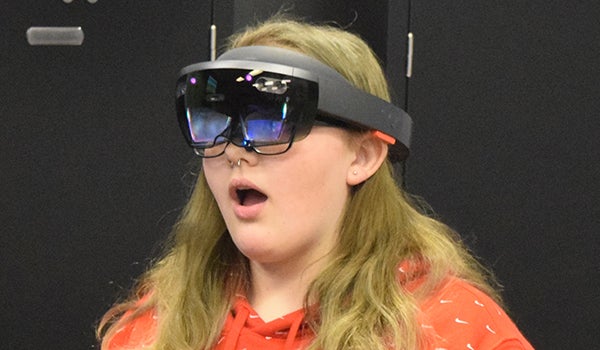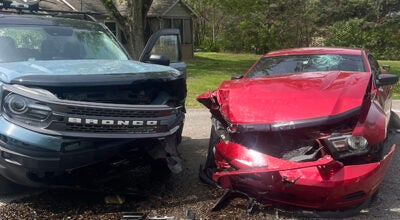SMC hosts IT Day
Published 8:47 am Monday, January 27, 2020
DOWAGIAC — Southwestern Michigan College’s IT Day Jan. 17 emphasized how versatile, lucrative and fun information technology careers can be, organizers said.
SMC offers networking and software development associate in applied science degrees. Networking is how computers operate and communicate with one another, which SMC students learn hands-on building PCs. Software developers create apps, software and websites for smartphones and computers.
Visitors on IT Day played two- and three-dimensional video games SMC students designed, as well as chess with pieces a 3D printer had produced. They also viewed a drone demonstration and compared virtual reality to augmented reality, dodging towering dinosaurs while wearing HTC Vive or Microsoft HoloLens headsets in the Barbara Wood Building computer labs.
“Virtual reality puts you completely inside the environment,” said associate professor Christine Stiles, who teaches software development. “Augmented, you still see what’s going on around you, with the virtual overlaid.”
IT degrees lead to careers in any industry, anywhere, SMC officials said, even fields like nursing.
“Even if you’re not sure what you want to do with IT, it’s designed so you get a little bit of everything,” Stiles told a group of about 40 students from Bronson. “There are classes you can take without prerequisites to see if you like it. There’s always a shortage of people, especially women, who are underrepresented, with IT backgrounds and education. In IT, the only constant is change.”
Assistant professor Eric Clayborn, who teaches networking, said building PCs “from the ground up is more my realm” than gaming, though, “There are internship possibilities with both tracks.”
Matt Collins, a manager in SMC’s office of information technology, attended SMC.
“I’m from Dowagiac,” Collins said. “Growing up, I was around the college a lot. I earned my associate’s in networking and continued in the Ferris program for my bachelor’s in computer information technology. I was a student worker in the bookstore, then IT with Mr. Clayborn as my supervisor. I came for engineering and did not want to take IT, but once I tried it, I realized I was pretty good at it, so I switched majors. I worked for another company for three and a half years and got good experience, but I really enjoyed working here [returning in December 2019.]”
“When I first came here, I didn’t know what I wanted to do. I didn’t know much about computers. SMC coached me through understanding networking,” said Severiano Sandoval, a 2018 networking graduate now on staff.
Recent software development graduate Jacob Modelewski, like Sandoval, did not know much about computers or coding when he started.
“Going through classes with fantastic teachers like Christine and Eric helped me understand what I was doing. Courses weren’t easy, but they were really fun and a great learning experience,” he said. “I’ve had opportunities to work with local businesses to help them develop web sites. I have certifications, which look fantastic on a resume when you apply for a job. Four classmates and I created an augmented reality game. It was a big step in our coding knowledge and fun working with the Microsoft HoloLens augmented-reality headsets.”
Niles’ Ethan Shirk, 27, president of the Circuit Birds IT Club, shared a different story.
“I waited 10 years after I graduated high school to come to college. I’ve been building computers since I was 14, but originally wasn’t going into IT. I was looking at psychology,” he said.
OIT’s Daryl Harris demonstrated drones from the size of finger cymbals to too large to launch indoors. Most feature camera capabilities and can be programmed to fly patterns for mapping. He operated one from his phone.
Drones can deliver packages, assess tall structures for firefighters (for example, during the Notre-Dame cathedral blaze in Paris in 2019), conduct search and rescue operations on inaccessible terrain, give a bird’s-eye view to real estate buyers and even race through warehouse obstacle courses for big prizes.
“You can make a lot of money racing drones or playing games,” Harris said, “but a lot of the jobs in the field don’t exist yet — until you create them.”







